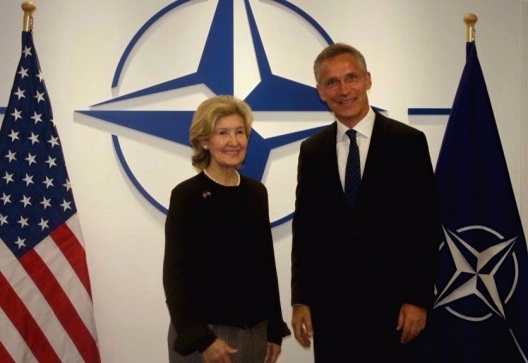 I was nominated as United States ambassador to NATO by President Trump in late June. As I made my rounds of congressional offices before my confirmation hearing, I found near unanimity from Republicans and Democrats alike on NATO’s future.
I was nominated as United States ambassador to NATO by President Trump in late June. As I made my rounds of congressional offices before my confirmation hearing, I found near unanimity from Republicans and Democrats alike on NATO’s future.
There is no appreciable difference of views among the president, Secretary of State Rex Tillerson, Secretary of Defense Jim Mattis and senators of either party on the need to revitalize NATO so it can meet today’s security needs while maintaining the fundamental principle of Article 5 of the organization’s founding treaty — that an attack on one is an attack on all.
There is a strong consensus that a renaissance of NATO offers the best hope to unite our Western allies against threats including intolerable Russian aggression in Ukraine, international terrorism, nuclear and missile capacities of rogue nations, and efforts to wipe out religious and individual freedoms around the globe….
As an essential start to revitalization, all NATO members must meet the defense-spending pledge made at the 2014 summit meeting in Wales — namely, 2 percent of gross domestic product should be spent on defense and 20 percent of each member’s national defense budget should be devoted to major equipment and modernization. If all 29 NATO countries were already meeting this level of funding, more than $100 billion in defense funding would have been generated in 2016, spreading a burden now being carried disproportionately by United States taxpayers. Allies must increase their investment because their own security and our collective security require it.
For America’s part, President Trump has proposed spending nearly $4.8 billion on the European Deterrence Initiative, an effort to shore up security in NATO’s eastern edge, as a demonstration of our will to defend our allies. But I know well from my time in the Senate that this cannot continue if the other NATO members do not meet their obligations….
Kay Bailey Hutchison, a former Republican senator from Texas, is the United States ambassador to NATO.
Image: Ambassador Kay Bailey Hutchison and Secretary General Jens Stoltenberg, Aug. 28, 2017 (photo: Amb. Kay Bailey Hutchison)
